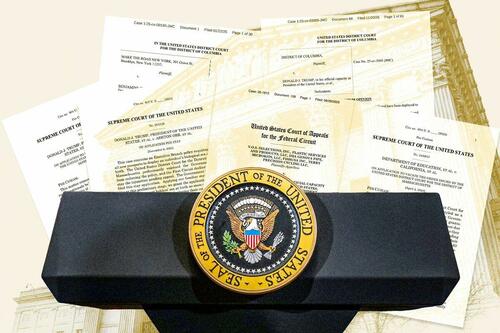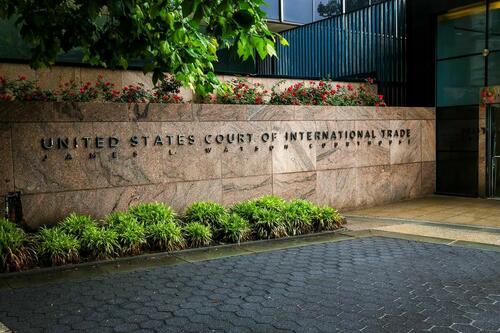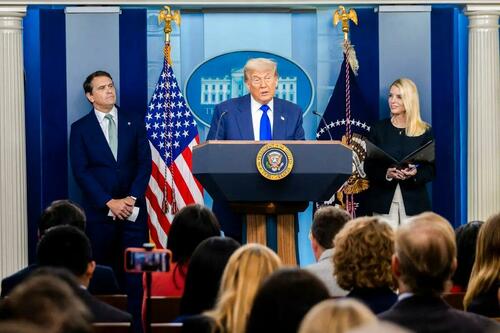Legal Cases Challenging Trump’s Agenda – Key Issues To Watch
Authored by Stacy Robinson and Sam Dorman via The Epoch Times (emphasis ours),
A flood of litigation continues to hamper President Donald Trump’s agenda, with hundreds of lawsuits challenging his actions on gender issues, tariffs, immigration, National Guard deployment, and other matters.

A common theme of many lawsuits is the claim that the president has overstepped his executive authority.
Some of the cases have already reached the Supreme Court, where Trump scored a major win in June and a series of wins on the emergency docket.
Eventual decisions on outstanding cases could have long-lasting effects. If Trump wins, he can press forward with his key policies and the court will have carved out a clearer scope of executive power.
Here are some of the key issues, the legal battlegrounds in which they will be fought, hints on how judges might rule, and their implications for the future.
Tariffs, Emergency Economic Powers
Trump’s broad tariff agenda sparked a legal battle that has been heard by the Supreme Court. Judgment is pending.
A group of states and businesses have challenged the tariffs the president imposed on Canada and Mexico over their failure to police drug trafficking and illegal immigration at their borders, as well as the reciprocal tariffs he imposed on scores of other countries.
Trump issued those tariffs under the 1977 International Emergency Economic Powers Act (IEEPA), which allows the president to take actions such as regulating imports during a national emergency. Before Trump, presidents had used the law only to impose sanctions.
The U.S. District Court for the District of Columbia ruled in May that the IEEPA does not authorize the president to impose tariffs.
In a separate case in May, the U.S. Court of International Trade ruled that Trump’s tariffs did not address the issue of drug trafficking, and were therefore unjustified. It also ruled that the IEEPA does not give Trump power to impose “unlimited” tariffs because that power belongs to Congress and has not been delegated to the president.
Those cases eventually reached the Supreme Court, which heard oral arguments on Nov. 5 and is yet to issue its decision.
During oral arguments, some justices expressed skepticism that Congress had authorized the type of tariffs Trump imposed.
The Supreme Court is also considering whether the law—if it does, in fact, authorize Trump’s tariffs—upsets the nation’s separation of powers and is therefore unconstitutional.
“Congress, as a practical matter, can’t get this power back once it’s handed it over to the President,” Justice Neil Gorsuch said. “It’s a one-way ratchet toward the gradual, but continual, accretion of power in the executive branch and away from the people’s elected representatives.”
At one point during the Nov. 5 hearing, Justices Amy Coney Barrett and Brett Kavanaugh seemed more sympathetic to the administration’s position. They questioned how, as one attorney argued, the law could allow Trump to impose something as large as a complete embargo but not a small tariff.

National Guard, Posse Comitatus
Citing high crime rates, Trump has attempted to federalize and deploy National Guard troops to major cities across the United States.
Officials in Memphis, Tennessee, welcomed the move, but state and local governments have sued to block the action in Chicago, Washington, Los Angeles, and Portland, Oregon.
The lawsuits challenge Trump’s invocation of Section 12406 of Title 10 of the U.S. Code, which allows presidents to federalize state National Guard troops under certain conditions.
The Trump administration has pointed to two of those conditions in particular: when the president is unable to execute the law using regular forces and when there is a rebellion or danger of a rebellion.
Trump’s challengers have found limited success in courts, winning lower court blocks but facing hurdles in the appeals process.
Most recently, Judge Jia Cobb of the U.S. District Court for the District of Columbia ruled on Nov. 20 that the president must end troop deployment in Washington, saying that the president can deploy troops only to address a specific situation, not for “whatever reason” he chooses. She paused that order to give the government time to appeal.
Judges in Oregon and Illinois also blocked Trump’s deployments while expressing doubt that the National Guard was needed to address crime in those areas. And a California judge ruled in September that Trump had violated a law known as the Posse Comitatus Act, which prevents federal troops from engaging in civilian law enforcement.
The administration is appealing each of those cases, and the Illinois ruling has reached the Supreme Court. The court has requested a briefing, asking both sides to clarify their interpretation of the line in Section 12406 stating that the president may call up the National Guard if he is “unable with the regular forces to execute the laws of the United States.”

Illegal Immigrants
Trump has focused on enforcing immigration laws, including through a ramp-up of deportations.
Previously, expedited removals were reserved for illegal immigrants detained within 100 miles of the U.S. border and within 14 days of illegal entry.
When he took office, Trump expanded rapid deportations to include illegal immigrants nationwide who had been in the country longer than two weeks, but less than two years.
On Jan. 22, advocacy group Make the Road New York sued, arguing that illegal immigrants were being removed without due process. A federal judge blocked the government’s policy in August, and on Nov. 22, a court of appeals declined to put that ruling on hold pending appeal.
Trump’s executive order in January revoking birthright citizenship for the children of illegal immigrants was challenged by numerous plaintiffs across the country. Those challenges were consolidated into Trump v. CASA.
When the case reached the Supreme Court, the justices did not rule on the legality of the executive order or the question of birthright citizenship, but instead ruled that such nationwide blocks—called universal or nationwide injunctions—are likely an abuse of lower courts’ power.
This ruling signaled to lower courts that they should issue such nationwide injunctions against a president’s policies sparingly.

Alien Enemies Act
Part of Trump’s deportation plan involved using the 1798 Alien Enemies Act, which allows swift deportations during an invasion, to remove alleged criminals and transnational gang members from groups such as Tren de Aragua.
Trump invoked that law and used it against the Venezuelan gang in March, but lower courts temporarily blocked the plan in April when a group of deportees sued.
The Supreme Court at first upheld the block, but later ruled that the Venezuelan plaintiffs were each required to bring a habeas petition individually challenging his or her removal and must be given time to do so.
In one ongoing case, W.M.M. v. Trump, an appeals court ruled 2–1 that the mass illegal entry of Tren de Aragua gang members does not necessarily constitute an “invasion” as defined by the Alien Enemies Act.
Circuit Judge Andrew Oldham of the Fifth U.S. Circuit Court of Appeals, dissenting from the majority, highlighted the current friction between Trump and the judiciary.
“The majority’s approach to this case is not only unprecedented—it is contrary to more than 200 years of precedent,” he wrote in his dissent.
“It reflects a view of the Judicial power that is not only muscular—it is herculean. And it reflects a view of the Executive power that is not only diminutive—it is made subservient to the foreign-policy and public-safety hunches of every federal district judge in the country.”
The Fifth Circuit vacated that ruling at the end of September and plans to hold an en banc hearing; the full slate of circuit judges may reach a different conclusion.
In another case, J.G.G. v. Trump, a federal judge ordered the government to halt deportation flights headed to El Salvador’s Terrorist Confinement Center.
The judge is pursuing a criminal contempt-of-court inquiry against the Trump administration, alleging that the order was ignored.
Read the rest here…
Tyler Durden
Wed, 11/26/2025 – 14:25ZeroHedge NewsRead More




 R1
R1
 T1
T1


